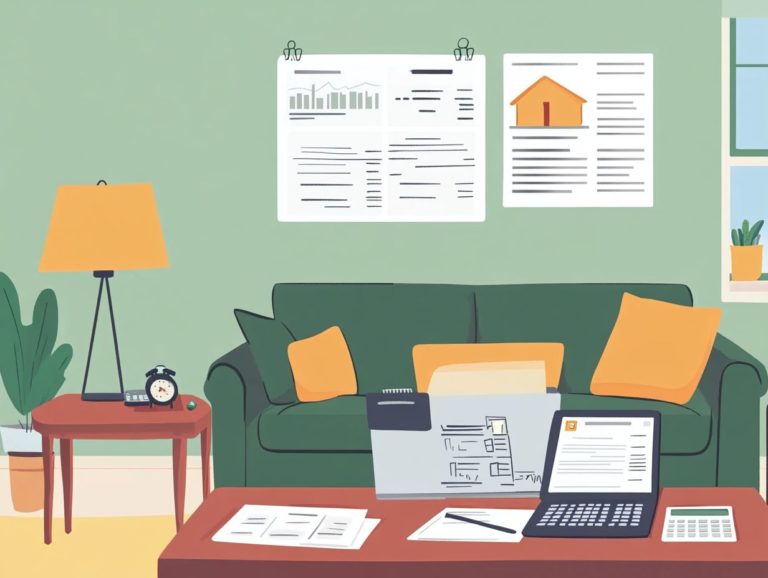What Should I Do Before Buying Home Insurance?
When it comes to safeguarding your home, grasping the ins and outs of home insurance is absolutely essential.
This guide clearly explains what you need to know, starting with the fundamentals of home insurance and why it s so important. You’ll learn how to assess your coverage needs. You’ll also explore a variety of policy options.
This guide also walks you through the process of selecting the right provider and preparing for the purchasing journey. Whether you re stepping into homeownership for the first time or reevaluating your current policy, this comprehensive resource empowers you with the knowledge to make informed decisions.
Contents
Key Takeaways:

Before buying home insurance, it is important to understand what it is and why it’s crucial. Be sure to consider what to know before buying home insurance by evaluating your home and assets and assessing your risk factors.
When choosing an insurance provider, consider factors such as their reputation, coverage options, and customer service.
Don’t wait until it’s too late understand your coverage needs today!
Understanding Home Insurance
Knowing your home insurance options can save you money and stress. Home insurance includes a range of coverage options that protect against risks related to property damage, liability claims, and personal belongings.
Homeowners insurance policies safeguard your dwelling and personal property, providing financial stability in the face of disasters or unexpected expenses.
By grasping the fundamental components of home insurance such as the various types of coverage, the premiums (the amount you pay for your insurance), and providers you can make informed decisions that truly reflect your needs and values.
What is Home Insurance?
Home insurance, often referred to as homeowners insurance, is your financial shield against the myriad risks that come with owning a home. This includes property damage and liability claims.
This vital safety net is composed of several components, each designed to address different facets of potential loss or damage.
Dwelling coverage is your first line of defense, protecting the physical structure of your home. It helps to cover repair costs from incidents like fires or natural disasters.
Then there’s personal property protection, which extends that security to your cherished belongings. It ensures that items such as furniture and electronics are replaced should they fall victim to theft or unexpected events.
Liability coverage is another critical aspect. It safeguards you from legal claims that may arise if someone sustains injuries while visiting your property.
Insurance companies evaluate these policies based on various factors, including your property’s location, your credit history, and your overall risk profile. This assessment ultimately shapes the premium and coverage limits that are tailored to meet your specific needs.
Why is it Important?

Home insurance is essential because it provides crucial protection against financial losses stemming from property damage, liability claims, and unexpected disasters.
This type of coverage secures your home’s physical structure and safeguards the valuable contents within it, from essential belongings to cherished family heirlooms.
For example, if disaster strikes and a fire occurs, home insurance can cover the costs of rebuilding while also addressing claims for damaged furniture and appliances. Natural disasters like storms or floods, which can wreak havoc on your property, are often included in many policies. This offers a lifeline during those trying times.
The emotional reassurance that comes from knowing you are financially safeguarded allows you to focus on recovery rather than fret over unexpected expenses. Having this insurance isn t just a precaution; it s an integral part of responsible homeownership that grants you peace of mind.
Determining Your Coverage Needs
Determining your coverage needs is crucial for ensuring you have adequate protection for your property and personal belongings against various risks.
By evaluating your home and assets and assessing the specific risk factors you face, you can tailor your insurance policy to fit your unique financial situation.
This approach provides essential protection against property damage, potential losses, and unforeseen expenses. Conducting a thorough evaluation allows you to avoid gaps in coverage and secures your investments with confidence and peace of mind.
Ready to protect your home? Start exploring your insurance options now!
Evaluating Your Home and Assets
Evaluating your home and assets is an essential step in understanding your insurance coverage needs. It ensures you have adequate protection against potential risks.
This process helps you gauge the overall worth of your property while identifying valuable items that may need specialized coverage.
Start by walking through each room, cataloging your belongings, and noting their condition, original purchase price, and replacement cost. Keeping detailed records is crucial. Photographs and receipts can be invaluable in supporting claims if damage or loss occurs.
Accurately assessing property values is vital as it directly influences your policy limits and premiums. This helps you avoid underinsurance or overpayment.
Take the time to evaluate your home! You ll feel secure knowing your investments are protected.
Assessing Your Risk Factors

Assessing your risk factors is crucial for determining the right level of home insurance coverage. This safeguards your property and personal belongings from potential threats.
Risk factors can vary dramatically based on your home’s location. For example, if you’re in an area prone to natural disasters like floods or hurricanes, you could see significant impacts on your insurance premiums.
Local crime rates should also be taken into account. Higher rates may increase the likelihood of theft or vandalism, influencing your overall coverage decisions.
Evaluate your property’s condition. Consider its age, maintenance needs, and safety features. These assessments empower you to make informed choices about your coverage, ensuring that you re adequately protected.
Discover the Best Home Insurance Policies for You
Understanding the nuances of different home insurance policies is essential for homeowners. This knowledge gives you the power to choose coverage options that align with your unique needs and protect your valuable assets.
Homeowners insurance can vary greatly in terms of coverage. Policies range from basic plans that provide essential dwelling protection to more comprehensive options that include special add-ons for high-value items and additional risks.
Each policy type is crafted to cater to distinct aspects of property protection, liability, and financial security, ensuring you have the right shield for your home.
Exploring Different Coverage Options
Exploring various coverage options within home insurance policies is crucial for homeowners. This ensures you have robust protection against property damage, liability claims, and potential losses.
Understanding the types of coverage available can significantly enhance your peace of mind. For instance, dwelling coverage protects the structure of your home from risks like fire or storms, while personal property protection safeguards your belongings such as furniture and electronics.
Liability coverage provides financial security if someone is injured on your property. You can customize your policy with special add-ons that enhance your basic coverage.
By selecting the right add-ons, such as those for valuable artwork or home-based businesses, you can tailor your insurance to fit your needs, creating a comprehensive safety net that truly reflects your lifestyle.
Choosing the Right Insurance Provider

Choosing the ideal insurance provider for your home insurance policy is a pivotal decision. This influences both your coverage options and your overall experience with claims and customer service.
Consider factors such as the provider’s reputation, the variety of policy types available, premium costs, and their history with claims handling.
By thoughtfully evaluating these elements, you can identify a provider that truly aligns with your needs and values.
Factors to Consider
When selecting an insurance provider for your home insurance policy, several crucial factors demand your attention. This ensures you secure adequate coverage at a reasonable premium.
First, look at the different coverage options tailored to your specific needs. Different providers may offer special extras, such as flood or earthquake protection, that could be vital for your situation.
Next, take a close look at premium costs. It’s important to find a provider that fits your budget without compromising essential coverage.
The claims process is also very important. A straightforward and efficient claims experience can significantly alleviate stress during unfortunate events.
Great customer service can make your insurance experience truly enjoyable! Responsive support can greatly enhance your overall satisfaction with the policy.
Preparing for the Buying Process
Getting ready to buy home insurance means you need to gather some important details. Knowing what to do before getting home insurance gives you the power to make an informed decision that secures adequate coverage for your home and assets.
You should compile details about your property, including its value, any renovations, and your personal belongings. It s also important to familiarize yourself with the various types of coverage and endorsements available to you.
Taking these steps will make your buying process smooth and easy!
Gathering Necessary Information
Gathering the necessary information is a crucial step in your home insurance buying journey. This enables you to provide precise details about your property and coverage needs.
First, assess your property’s current market value. This will directly affect your premium rates and coverage limits.
It’s equally important to take stock of your home inventory. Documenting all valuable items will help you when it comes to replacement costs.
Don’t overlook the significance of recent renovations or improvements. These can greatly affect your coverage options, as updated features may alter both value and risk considerations.
By compiling this information, you can secure more accurate quotes. This will help you choose coverage options that genuinely align with your unique circumstances and financial objectives.
Understanding Policy Terms and Conditions
Understanding the policy terms and conditions of home insurance is essential for homeowners. It ensures you know your coverage limits, exclusions, and obligations.
By grasping these elements, you can make informed decisions to protect yourself from potential risks. Coverage limits set the highest amount you can get back if you file a claim, while exclusions define what isn t covered.
It s vital to know about deductibles, the amount you pay out-of-pocket before your insurance starts. This knowledge helps in budgeting for unexpected repairs or damages.
By understanding these terms, you protect your investment and empower yourself to find the policy that fits your needs.
Frequently Asked Questions
What Should I Do Before Buying Home Insurance?
Before purchasing home insurance, assess your needs and research different providers for the best coverage.
Why Is It Important to Assess My Needs Before Buying Home Insurance?
Assessing your needs helps you determine the type and amount of coverage necessary for your home and belongings. This ensures you have adequate protection for unfortunate events.
What Factors Should I Consider When Researching Insurance Providers?
- Coverage options
- Reputation
- Customer reviews
- Pricing
- Licensing and financial stability
Should I Compare Quotes from Different Insurance Providers?
Yes! Comparing quotes is highly recommended to find the best coverage at an affordable price. It also gives you a clearer understanding of available options.
Is It Necessary to Read the Fine Print Before Buying Home Insurance?
Absolutely! Reading and understanding the fine print of your policy is crucial. This helps clarify coverage, exclusions, and limitations.
What Should I Do If I Have Questions or Concerns About My Home Insurance Policy?
If you have questions or concerns, contact your insurance provider for clarification. They will explain the details of your policy.
Don t wait! Start protecting your home by understanding your insurance options today.






